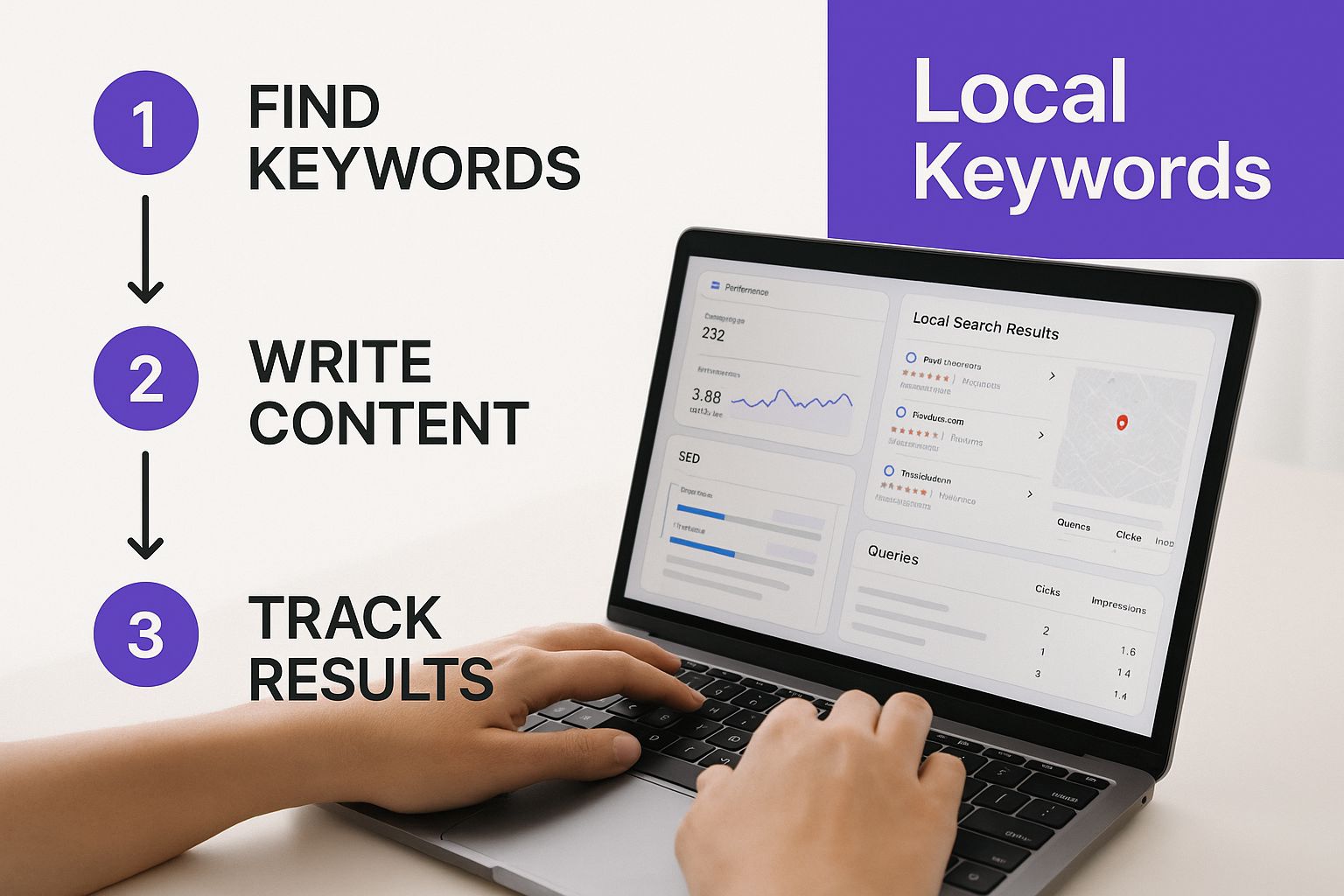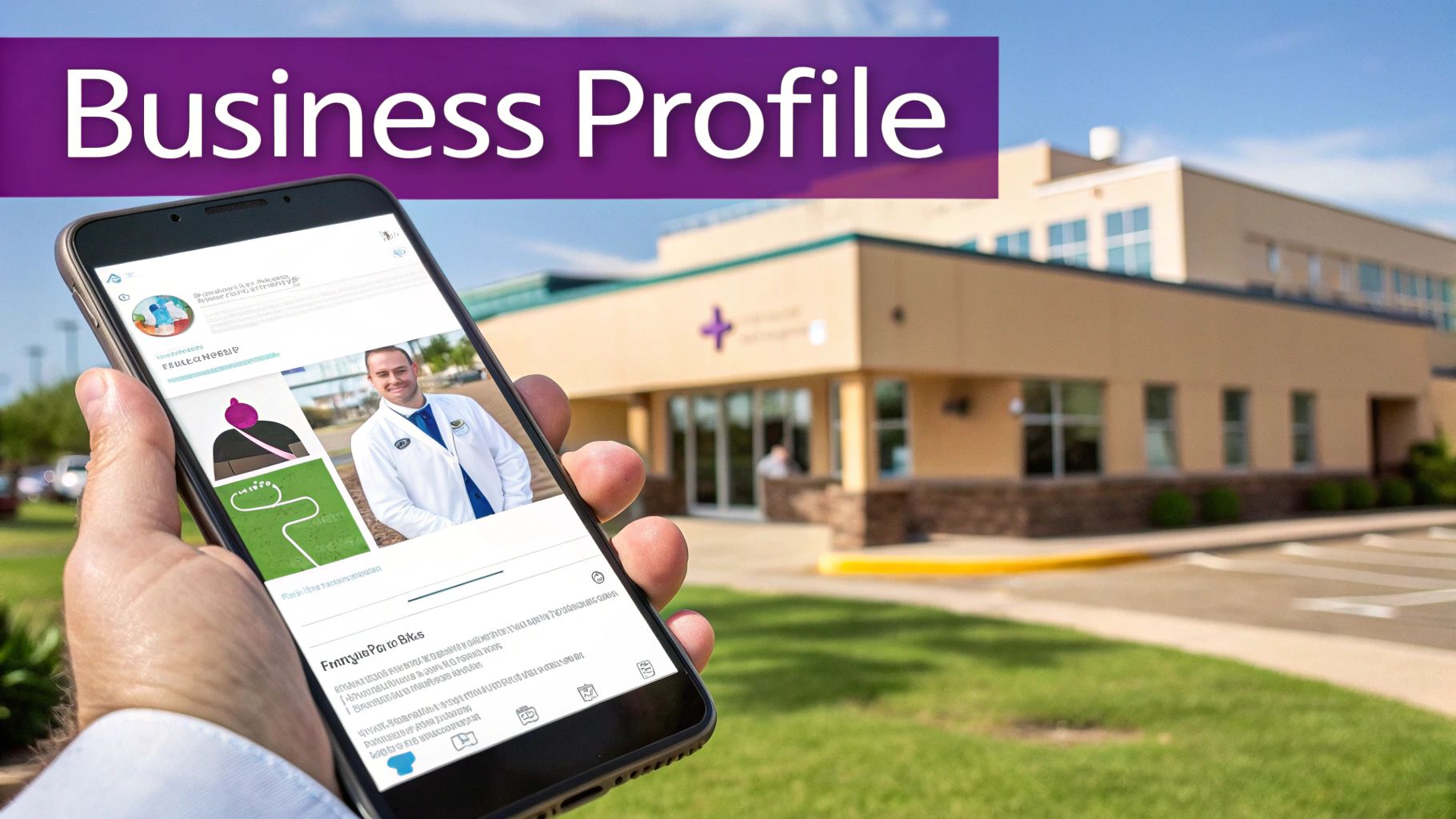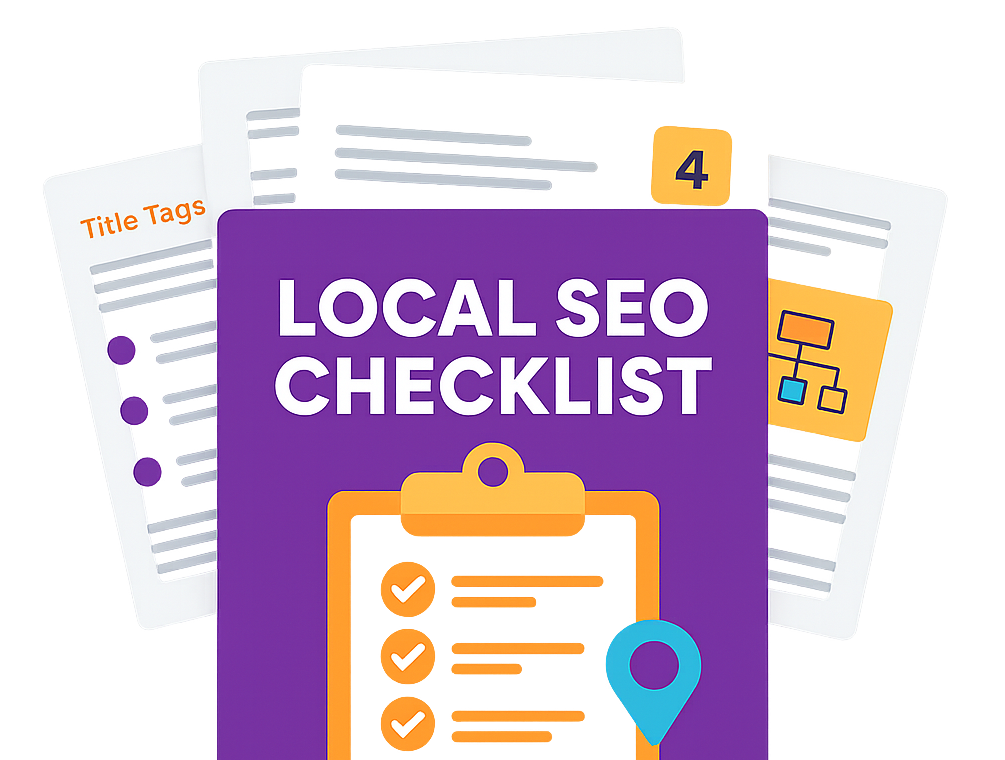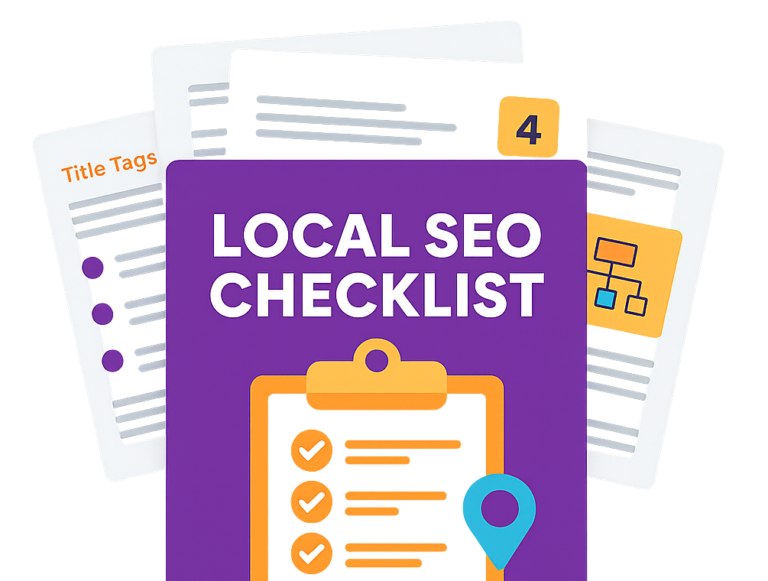When a patient needs a doctor, dentist, or specialist clinic, their first move isn't to ask a friend anymore. It's to pull out their phone. This is where healthcare local SEO comes in.
It’s the art and science of making sure your private practice shows up when patients in your area are searching for care. Think of it this way: when someone searches for "private GP in Manchester," local SEO is what gets your clinic listed in that all-important Google 'Local Pack'. It’s how you turn a simple online search into a new patient walking through your door.
Why Your UK Healthcare Practice Needs Local SEO
Not too long ago, finding a new doctor was all about word-of-mouth. Today, that journey almost always starts with a Google search. Patients expect to find immediate, relevant, and local results when they need medical attention, whether it's for a routine check-up or something more urgent.
This shift means just having a website isn’t enough to keep a practice growing. You have to be visible at the exact moment a potential patient is looking for the services you offer. A focused healthcare local SEO strategy makes that happen. It’s about connecting with people in your community right when they need you the most.
The Power of Local Visibility
The ultimate goal? Securing a spot in Google's 'Local Pack'—that box at the top of the search results showing a map and three local practices. This is prime online real estate. Landing here instantly builds trust and makes your practice the obvious choice.
For healthcare providers, this visibility is everything. In fact, around 93% of local searches end with a click on one of those top three listings. It's a clear signal of just how critical this placement is.
A well-oiled local SEO plan delivers some serious benefits for your practice:
- More Patient Enquiries: Better visibility means more phone calls, more contact form submissions, and more appointments booked directly from your site.
- Builds Trust and Authority: A high ranking tells both patients and Google that your practice is a credible, established leader in the local healthcare community.
- Levels the Playing Field: It helps smaller, independent clinics go toe-to-toe with larger medical groups and hospitals in the same area.
- Smarter Marketing Spend: Unlike traditional advertising, local SEO targets patients who are already actively looking for your services, delivering a much higher return on investment.
At the end of the day, local SEO isn't just another marketing task. It’s a core part of modern patient acquisition. It ensures your practice is found by the right people, in the right place, at precisely the right time. For a closer look at the fundamentals, our guide on small business local SEO breaks down the core principles that drive success.
Building Your Foundation with Google Business Profile
Your Google Business Profile (GBP) is the absolute cornerstone of your local SEO strategy. For many potential patients, it’s the very first time they'll encounter your practice online—a digital front door that gives them everything they need to know at a glance. Think of it as your single most important online asset for bringing local patients through your actual door.
Getting this right is non-negotiable. A fully optimised profile doesn't just put you on the map; it actively works to fill your appointment book. In the UK, businesses with complete profiles are roughly 70% more likely to attract visits from local searchers. We've seen verified listings pull in over 21,000 views a year in Google Search alone.
Nailing the Essentials First
Before you even think about the fancy features, you need to get the basics perfect. Accuracy and consistency are everything here. We’re talking about your NAP consistency—that’s your Name, Address, and Phone Number.
Even a tiny discrepancy, like using "Rd." in one place and "Road" in another, can throw search engines off and make potential patients question your legitimacy.
- Practice Name: This needs to be your official, registered business name. Use the exact same name that’s on your clinic's sign.
- Address: Enter your physical address with precision. Double-check the postcode and, crucially, make sure the map pin is dropped right on your building's location.
- Phone Number: Always use a local number. It’s familiar, trustworthy, and makes it easy for patients to call you directly.
This is the bedrock data Google uses to verify you’re a real, local practice and show you to the right people.

Starting with clean, accurate details means every other optimisation effort you make will be built on solid ground.
Choosing the Right Categories
Your categories are how you tell Google exactly what you do. Get this wrong, and you'll show up for the wrong searches, or worse, not at all.
Start with a primary category that sums up your main service—think 'Doctor', 'Dental Clinic', or 'Physiotherapist'. From there, add secondary categories for any other specialities you offer. If you're a dentist who also does cosmetic work, add 'Cosmetic Dentist'. A GP with a focus on travel medicine? Add 'Travel Vaccination Centre'. The more specific you are, the better the quality of patients you'll attract.
Pro Tip: Don’t sleep on your business description. This is your chance to really connect with prospective patients. Use this space to explain what makes your practice different, mention a few key services, and weave in some of those local keywords you’ve researched. It’s your opportunity to go beyond a dry list of services and show some personality.
A well-crafted profile is so much more than a simple listing; it’s a powerful tool for patient acquisition. If you want to take things to the next level, our complete guide on Google Business Profile optimisation is packed with more advanced techniques.
Mastering On-Page SEO for Your Practice's Website
Your Google Business Profile is a massive signal to search engines, but it's only half the story. The real magic happens when your profile and your website work together in perfect harmony. This is where on-page search engine optimisation (SEO) comes in. It’s all about fine-tuning your website's content and structure to tell Google exactly who you are, what you do, and—most importantly—where you do it.
Think of it as the bridge between a potential patient finding you on Google Maps and actually booking an appointment. When your website reinforces the information on your GBP, Google sees a consistent, trustworthy local authority. That’s a huge factor in ranking well.

Uncovering Local Patient Intent with Keyword Research
Good on-page SEO starts with getting inside the head of your potential patients. What are they actually typing into the search bar? This isn't about guesswork; it's about identifying specific, location-based keywords that signal a clear need for your services.
Put yourself in their shoes. They aren't just searching for "dentist." They're looking for an "emergency dentist in Manchester" or a "private GP near Canary Wharf." These longer, more specific phrases are your golden tickets.
So, how do you find them?
- Brainstorm service + location combos. List all your services ('physiotherapy', 'dental implants', etc.) and pair them with your town, city, and even specific districts or neighbourhoods.
- Use Google's autocomplete feature. Start typing a search like "children's orthodontist in…" and see what suggestions pop up. These are based on real, popular searches from people in your area.
- Spy on your competitors. Have a look at the page titles and headings on the websites of other local practices that are ranking well. What terms are they targeting? It’s a great way to find opportunities you might have missed.
Once you have a solid list, you can start weaving these keywords naturally into your website's pages.
Structuring Your Website for Local Success
A well-organised website makes it incredibly easy for both patients and search engines to find what they're looking for. For a healthcare practice, this means creating dedicated pages that speak directly to local needs.
A common mistake I see is practices lumping all their services onto a single page. This just dilutes your relevance. Creating separate, detailed pages for each core service—and for each practitioner—is a much smarter strategy.
This structure allows you to target very specific keywords on each page. For instance, your "Dental Implants in Bristol" page should be fully optimised for that exact term. A page for "Dr Jane Smith, Paediatrician in Leeds" helps you rank when parents search for her by name.
Don't forget to embed a Google Map on your contact or location page; it's a direct, visual signal to Google of your physical presence. Our guide on on-page SEO best practices digs deeper into building a strong site structure.
Behind the scenes, implementing local business schema markup is another crucial step. It gives search engines structured data about your practice—your address, opening hours, and services—making it easier for them to display this information directly in the search results.
Here’s a quick checklist to keep you on the right track:
Essential On-Page SEO Elements for Healthcare Websites
| SEO Element | Implementation Tip for Healthcare | Impact on Local SEO |
|---|---|---|
| Title Tags | Include your primary service and location. E.g., "Expert Physiotherapy in Chelsea | The Wellness Clinic". |
| Meta Descriptions | Write a compelling summary (under 160 characters) that encourages clicks. Mention your location and a key benefit. | Improves click-through rate from search results, signalling relevance to Google. |
| Header Tags (H1, H2) | Use your main keyword in the H1 tag. Use H2s for sub-topics like "Our Treatment Process" or "Meet Our Specialists". | Helps Google understand the page's structure and hierarchy of information. |
| Localised Content | Write content that mentions local landmarks, neighbourhoods, or community involvement. Show you're part of the local fabric. | Builds strong geographic relevance and trust with local searchers. |
| NAP Consistency | Ensure your Name, Address, and Phone number are identical across your website, GBP, and other listings. | Critical for building trust with search engines and avoiding confusion. |
| Schema Markup | Implement LocalBusiness and MedicalClinic schema to explicitly define your practice details for search engines. |
Helps you qualify for rich snippets in search results, like opening hours and review stars. |
Ultimately, the goal is to create content that not only ranks but also provides genuine value, turning searchers into patients. This is particularly effective in healthcare, where the intent to act is high. In fact, UK healthcare sites see an average SEO conversion rate of around 4.8%, which is significantly higher than the cross-industry average. Getting your on-page SEO right is the key to tapping into that potential.
Building Trust Through Reviews and Citations
Beyond your own website and Google Business Profile, your practice's reputation is really built across the wider web. Two of the most powerful tools in your arsenal here are local citations and patient reviews.
Think of them as third-party endorsements. They tell both potential patients and search engines that your practice is a legitimate, trusted part of the local community. Every time your practice is mentioned correctly online, it’s like a vote of confidence. When these mentions are consistent and paired with positive patient feedback, you’ve got a winning formula for attracting new appointments.

The Power of Consistent Citations
A local citation is simply any online mention of your practice's Name, Address, and Phone number (NAP). You'll find these on all sorts of sites, from well-known UK directories to niche healthcare-specific portals.
The goal is simple but absolutely crucial: consistency. Every single citation must match the NAP information on your Google Business Profile and website perfectly. I've seen even tiny variations, like "Clinic" versus "Medical Clinic," create confusion for search engines and water down a practice's local authority.
Key places to build your citations include:
- Major UK Directories: Think Yell, Thomson Local, and Scoot. These are the foundational listings every local business needs to have sorted.
- Healthcare-Specific Directories: Sites like IWantGreatCare, Doctify, or Private Healthcare UK are highly relevant and carry serious weight in your sector.
- Local Business Associations: Getting listed on your local Chamber of Commerce or community websites also sends strong geographic signals to Google.
A quick audit is the best place to start. Just search for your practice name and see what comes up—it often reveals inconsistencies that need fixing. Building this strong foundation of accurate citations is a vital part of your off-page optimisation. For a deeper dive into this, our ultimate guide to high-authority directory submissions lays out a clear strategy.
The Art and Science of Patient Reviews
Reviews are the new word-of-mouth, plain and simple. They're often the final deciding factor for a patient choosing between two similar practices. A steady stream of recent, positive reviews sends powerful trust signals that directly impact how visible you are in the 'Local Pack'.
Never underestimate the power of responding to every single review. A thoughtful reply to positive feedback shows you appreciate your patients. A professional, empathetic response to a negative review demonstrates that you listen and care—a crucial trait in healthcare.
Encouraging feedback should just be a standard part of your patient experience. This doesn't mean offering incentives, which is unethical. It's about making it easy for happy patients to share their thoughts. A simple follow-up email after an appointment with a direct link to your Google review page can be incredibly effective.
Responding promptly and professionally is non-negotiable. Thank patients for their time and address any specific points they raise. For negative reviews, try to take the conversation offline if you can, but always acknowledge their feedback publicly with a commitment to resolving the issue. This transparency builds immense trust with prospective patients who are watching how you handle feedback.
Advanced Strategies for Competitive Healthcare Markets
When your practice is in a bustling urban centre like London, Manchester, or Birmingham, the basics of local SEO just won’t cut it. In these hyper-competitive markets, you have to move beyond the standard playbook and get a bit more strategic to really gain an edge. It’s all about thinking more granularly about your community and more deliberately about your digital authority.
Standing out means becoming the go-to local healthcare resource, not just another clinic showing up in the search results. You need to build a real connection with your immediate community and prove your expertise in ways your competitors simply aren't.
Creating Hyperlocal Content That Resonates
Generic blog posts about common health conditions are a dime a dozen. When the competition is this fierce, the real key is creating hyperlocal content that firmly anchors your practice in the community. This is content tailored specifically to the interests, events, and health trends happening right in your neighbourhood.
Think beyond the four walls of your clinic. What’s going on locally that you can tie back to health and wellness?
- Community Health Initiatives: Got involved in a local fun run or a wellness fair at a nearby community centre? Write about it.
- Local Event Tie-ins: Is a major event like the Manchester Marathon happening soon? Create content on injury prevention for runners or post-race recovery tips.
- Seasonal Health Advice: A post about managing hay fever in London's Hyde Park during spring connects a common problem to a specific, recognisable place.
This approach does more than just fill your blog; it shows you're an active, engaged member of the community. That builds trust and sends powerful local relevance signals to Google.
Earning High-Value Local Backlinks
Backlinks are the currency of SEO, acting as votes of confidence from other websites. In a tough market, getting links from other respected local organisations is a total game-changer for your website's authority. This isn't about quantity; it's all about quality and local relevance.
A single backlink from a well-regarded local charity or a prominent business in your area is worth more than dozens of low-quality directory listings. It tells Google that you are a trusted and integral part of the local ecosystem.
So, how do you build these connections? Consider sponsoring a local youth sports team to get a link from their site. You could also offer to give a health talk for a local business or community group in exchange for a mention and a link. Partnering with non-competing businesses, like a nearby gym or health food shop, for a joint wellness promotion can also create powerful, cross-promotional links.
Prioritising Technical Excellence and Compliance
When the race is this tight, technical performance can be the deciding factor. Your website absolutely must be flawless on mobile, since that’s where most local health searches are happening. Page speed is just as critical—a slow-loading site will only frustrate potential patients, sending them clicking away and damaging your rankings.
And finally, you need to play by the rules. All your promotional efforts must stick to UK healthcare advertising regulations. Make sure your website content and any online ads comply with guidelines from bodies like the Advertising Standards Authority (ASA) and the General Medical Council (GMC). This not only protects your practice legally but also cements your reputation as a trustworthy, professional healthcare provider.
Your Top Healthcare Local SEO Questions, Answered
When you're diving into local SEO, a few questions always seem to pop up. We get it. To save you the guesswork, here are the straightforward answers to the queries we hear most often from healthcare practices across the UK.
How Long Does It Take to See Results?
This is the big one, isn't it? Everyone wants to know when the phone will start ringing. The honest answer is that local SEO is a long game, not an overnight fix. You should start seeing noticeable movement in your local rankings and a real increase in patient enquiries within three to six months.
That said, some early wins can show up much faster. A properly optimised Google Business Profile, for example, can boost your visibility in just a few weeks. But the timeline really depends on things like how fierce the competition is in your area, the current state of your website, and how consistently you work on it. Think of it as building trust with search engines—and that takes time.
Is It Permissible to Ask Patients for Reviews in the UK?
Absolutely. Not only is it permissible, but you should absolutely be encouraging patients to leave reviews, as long as you do it the right way. The golden rule here is to never offer an incentive. No gift cards, no discounts, no freebies in exchange for a review. That’s a fast track to violating platform guidelines and, more importantly, losing patient trust.
The best approach is to simply make it easy for them. After an appointment, a simple follow-up email with a direct link to your Google Business Profile or other review sites works wonders. Keep the request simple and professional—ask for genuine feedback on their experience. This gives you invaluable insights and helps future patients make a confident choice.
What Is the Most Important Part of Local SEO for a Doctor's Surgery?
If you're going to focus your energy on just one thing, make it your Google Business Profile (GBP). While every part of local SEO works together, your GBP is without a doubt the most critical piece of the puzzle for any doctor's surgery.
Think of your GBP as the digital front door to your practice. It’s often the very first impression a potential patient gets, showing them everything from your address and opening hours to what other patients are saying about you.
A GBP that is accurate, complete, and actively managed is the foundation for everything else. Your on-page SEO, citation building, and link-building efforts will never hit their full stride without a rock-solid profile backing them up. It really is the central hub of your local presence online.
At Bare Digital, we create SEO strategies that get healthcare practices like yours in front of the right local patients. Our focus is on building a powerful online presence that translates into real-world appointments and sustainable growth. Book your free SEO Health Check today and we'll give you a tailored activity plan to kickstart your local visibility.








